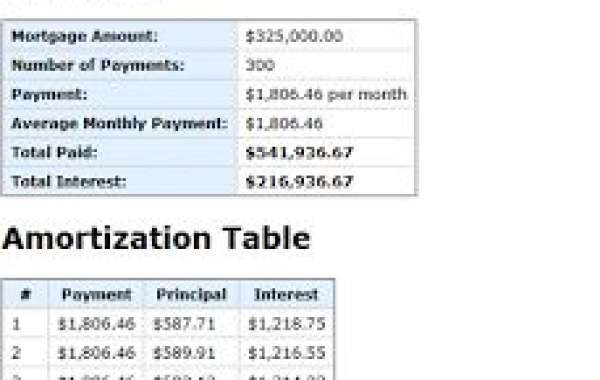A mortgage calculator is a valuable tool that assists potential homeowners establish their regular mortgage obligations based on various factors. By inputting details like the loan volume, interest charge, loan term, and occasionally property taxes or insurance premiums, the calculator may easily estimate just what a borrower can get to cover each month. That software is especially ideal for first-time homebuyers who may not have an obvious comprehension of how mortgage funds are structured or what they are able to afford. With a mortgage calculator, persons may get a clearer image of their financial obligations and better strategy their budget accordingly.
The primary function of a mortgage calculator would be to determine the regular payment. Including not merely the key and interest but may also integrate additional fees like property taxes, homeowners insurance, and also personal mortgage insurance (PMI) if the borrower puts down less than 20% of the home's value. These additional prices may somewhat influence the sum total monthly cost, therefore it's crucial that you factor them in when assessing affordability. Some advanced mortgage calculators actually allow users to take into account homeowners association (HOA) expenses, that may vary with respect to the neighborhood.
Knowledge how a regular cost is broken down is another important advantage of employing a mortgage calculator. In the early decades of a loan, a bigger part of the payment goes toward interest rather than principal. With time, however, the primary section increases since the loan stability decreases. A mortgage calculator usually offers an amortization schedule, which reveals this dysfunction over the life of the loan. It will help borrowers know how significantly of the regular payment is going toward reducing the loan stability, and how much is essentially just spending the lender for the use of their money.
One of the most crucial factors in determining mortgage obligations may be the curiosity rate. The rate at which the loan is financed directly influences just how much a borrower can pay over living of the loan. Small changes in curiosity costs can have a big effect on monthly payments. For example, a higher interest charge raises the expense of funding, indicating higher monthly obligations and more compensated in fascination around time. Conversely, a diminished charge decreases the regular cost and the general charge of the mortgage. Mortgage calculators allow users to experiment with various fascination costs to observe how changes may impact their payments.
Mortgage calculators may also be helpful for evaluating different loan options. For example, a borrower might want to assess the monthly payment on a 15-year loan versus a 30-year loan. The monthly cost for a 15-year mortgage may an average of be higher as a result of shorter repayment time, but the full total interest Mortgage Calculator paid around the life of the loan is going to be lower. Using a mortgage calculator, borrowers can simulate numerous circumstances and decide which loan term most readily useful meets their budget and long-term economic goals.
As well as supporting borrowers calculate payments, mortgage calculators may also offer as an instrument for qualifying for a loan. Lenders usually use specific requirements, like debt-to-income ratio (DTI), to determine whether a borrower are able to afford a mortgage. A mortgage calculator can provide an calculate of the borrower's DTI by factoring inside their revenue and monthly debt obligations. By pushing within their money and other debts, consumers could see whether they match the typical DTI needs for confirmed loan.
Another feature that many mortgage calculators include is the capacity to calculate how much a borrower can afford based on their preferred regular payment. That is ideal for potential customers who have a collection budget in your mind but aren't sure just how much house they are able to afford. By inputting a goal regular cost, the calculator may back-calculate the loan volume they could qualify for, factoring in the estimated curiosity rate and loan term. This provides buyers a concept of the price range they should be contemplating when searching for a home.
Ultimately, mortgage calculators are not simply for homebuyers—they are also useful for homeowners who are contemplating refinancing their current mortgage. A refinance mortgage calculator might help determine the influence of refinancing on monthly funds, interest charges, and the total loan term. Additionally, it may show whether refinancing will save money in the long run or whether the costs of refinancing outnumber the benefits. With the ability to alter loan terms and interest charges, homeowners may evaluate whether refinancing is just a economically noise decision centered on the recent




